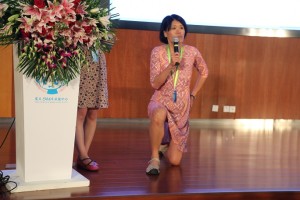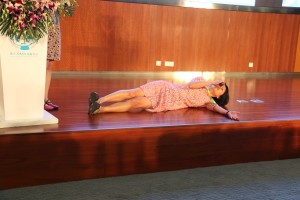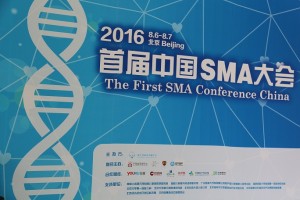 To honor Spinal Muscular Atrophy (SMA) Awareness Month this August, the first China SMA conference was held successfully in Beijing on August 6, 2016. Organized by Beijing Meier Advocacy & Support Center for SMA, nearly 200 SMA patients and their families attended the conference to gain important knowledge about the condition as well as treatment and therapy options. The speakers included leading experts in clinical SMA, genetics, genetic screening, prenatal diagnosis, rehabilitation therapy, and drug research areas from the USA, Taiwan, Hong Kong and the mainland. LIH Olivia’s Place was proud have Eva Ma, Occupational Therapist at our Beijing Clinic, as a speaker during the conference.
To honor Spinal Muscular Atrophy (SMA) Awareness Month this August, the first China SMA conference was held successfully in Beijing on August 6, 2016. Organized by Beijing Meier Advocacy & Support Center for SMA, nearly 200 SMA patients and their families attended the conference to gain important knowledge about the condition as well as treatment and therapy options. The speakers included leading experts in clinical SMA, genetics, genetic screening, prenatal diagnosis, rehabilitation therapy, and drug research areas from the USA, Taiwan, Hong Kong and the mainland. LIH Olivia’s Place was proud have Eva Ma, Occupational Therapist at our Beijing Clinic, as a speaker during the conference.
Spinal muscular atrophy (SMA) is a disease that robs people of physical strength by affecting the motor nerve cells in the spinal cord, taking away the ability to walk, eat, or breathe. It is the number one genetic cause of death for infants. SMA is caused by a mutation in the survival motor neuron gene 1 (SMN1). In a healthy person, this gene produces a protein that is critical to the function of the nerves that control our muscles. Without it, those nerve cells cannot properly function and eventually die, leading to debilitating and often fatal muscle weakness. SMA affects approximately 1 in 10,000 babies, and about 1 in every 50 people is a genetic carrier. SMA can affect any race or gender.
Though there is not yet an effective pharmaceutical treatment for SMA, various nursing services and therapies can delay progression of the disease, improve life quality, and earn more time for drug research. With the current progress in genetics research, SMA has been identified by the US National Institute of Health (NIH), as one of the neuromuscular diseases which will likely yield promising breakthroughs. However, in China, therapy and rehabilitation services available to SMA patients in China are underdeveloped and a lot of work remains on increasing clinical research and therapy, rehabilitation and education. SMA patients and their families lack the knowledge, access to resources and treatment/therapy options that are the standard for SMA patients in the rest of the world.
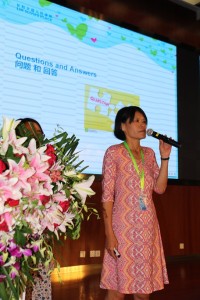
Eva Ma, Occupational Therapist, offered a dynamic presentation, demonstrating key concepts to conference participants
LIH Olivia’s Place aims to help to close the gap when it comes to providing high-quality rehabilitation services to pediatric SMA patients in China. Eva Ma’s 90-minute presentation was titled “Positioning Children and Teenagers for Function,” and included valuable information about how to effectively position children with SMA for effective skeletal and muscular development and to maintain the most efficient respiratory (breathing) functions and feeding and nutritional status. Eva emphasized the importance of regularly changing a child’s position, which is critical for developing gross and fine motor skills, maintaining functional use of their hands, and preventing further deformities. It is critical to provide solid support for a child with SMA in all different positions so that they have the stability needed in order to maintain proper body alignment throughout the day.
Thi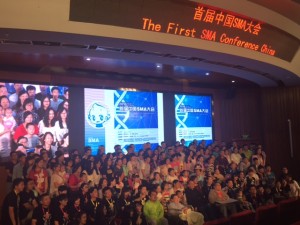 s functional presentation was very well-received by conference participants, and the Q&A session spilled over its allotted time, as many parents sought out Eva’s expertise on specific challenges their children are facing.
s functional presentation was very well-received by conference participants, and the Q&A session spilled over its allotted time, as many parents sought out Eva’s expertise on specific challenges their children are facing.
With the large demand of SMA patients needing access to high-quality rehabilitation services in China, LIH Olivia’s Place and Olivia’s Foundation are now partnering with Beijing Meier Advocacy Group to assist these children and their families. We look forward to making a difference in the lives of children with SMA!
Meier Advocacy & Support Center for SMA was founded by actress Feng Jiamei and SMA Type III patient Ma Bin. It is a non-profit organization dedicated to helping people with SMA and supports families through networking, information, and services and sponsorships. The organization maintains the Chinese SMA Patient Registry and collects clinical and genetic information of individuals affected by Spinal Muscular Atrophy to promote clinical trials in China.





